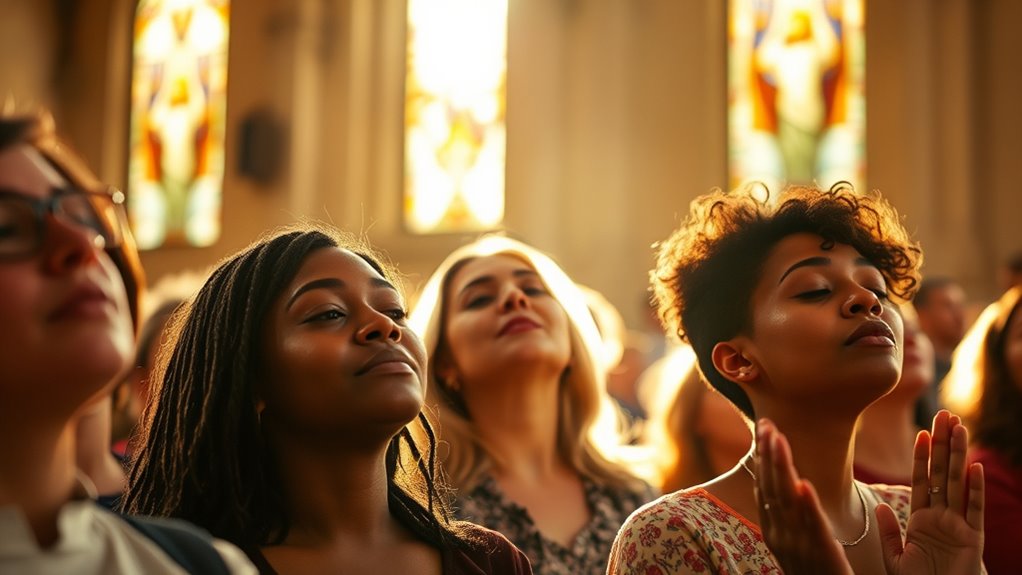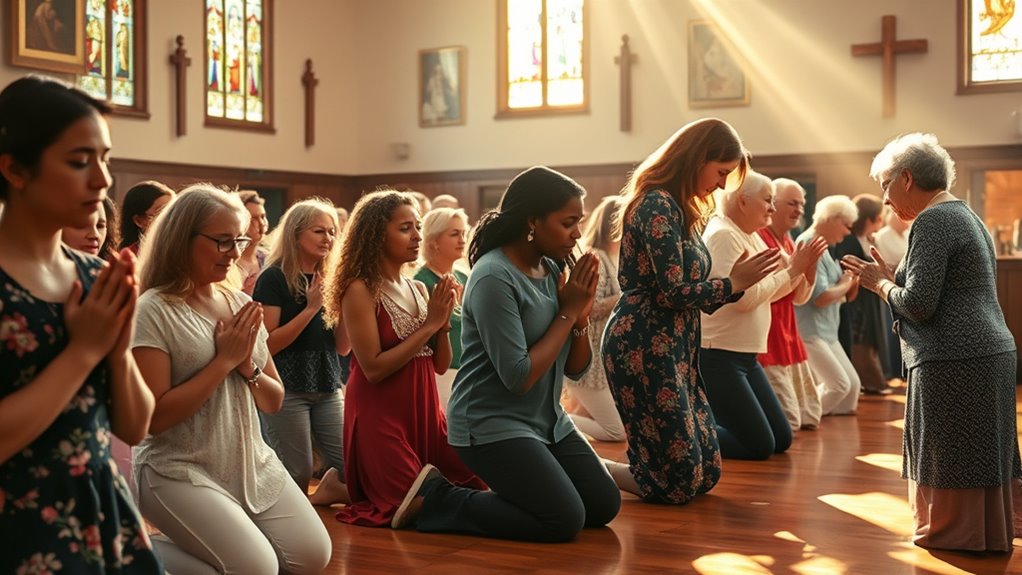Worship is more than just singing on Sundays; it’s a daily lifestyle that guides your attitudes, actions, and relationships through genuine devotion. It involves intentional choices, humility, and gratitude that reflect your connection with something greater. Small acts of kindness, prayer, and mindful routines turn everyday moments into meaningful expressions of faith. If you’re curious about how worship can shape your life beyond church services, there’s much more to explore.
Key Takeaways
- Worship is a lifestyle that influences daily decisions, attitudes, and interactions beyond just singing on Sundays.
- It involves aligning the mind and heart with spiritual truths through prayer, reflection, and intentional actions.
- Genuine worship stems from sincere attitudes of humility, reverence, and a desire to connect with something greater.
- Acts of service, kindness, and gratitude are practical expressions of worship in everyday life.
- Incorporating spiritual discipline and intentional rituals transforms ordinary moments into ongoing acts of devotion.
Understanding the True Meaning of Worship

What does worship truly mean beyond the rituals and ceremonies? It’s about connecting deeply with something greater than yourself. Worship involves more than just singing or formal rituals; it’s a form of music therapy that touches your soul, bringing peace and clarity. Ritual symbolism plays an essential role, transforming simple acts into profound expressions of devotion. When you engage in worship, you’re not just going through motions—you’re actively aligning your mind and heart with spiritual truths. This authentic connection can heal, inspire, and remind you of your purpose. Understanding this connection can also be informed by insights from personality traits, which help explain how individuals engage with spiritual practices in ways that resonate personally. Worship isn’t limited to specific times or places; it’s an ongoing, heartfelt response that shapes your inner life. Recognizing the metaphorical significance of rituals can deepen your understanding of their role in fostering a genuine spiritual experience. Additionally, incorporating elements of cultural heritage can evoke a sense of timeless reverence, enriching the worship experience. Exploring the role of intention behind acts of worship can further reveal how genuine devotion is cultivated. Understanding this helps you see worship as a meaningful, life-enriching experience beyond rituals.
Worship as a Lifestyle, Not Just a Ritual

Worship extends beyond isolated rituals or moments of prayer; it becomes a way of living that influences your daily decisions and interactions. Sacred rituals are meaningful, but true worship involves ongoing personal devotion that shapes your attitude and choices throughout the day. When you see worship as a lifestyle, you intentionally align your actions with your faith—showing kindness, integrity, and humility in everything you do. It’s about integrating your beliefs into your daily routine, making every moment an opportunity to honor God. This mindset transforms worship from a scheduled event into a continuous expression of love and reverence. Recognizing that worship is rooted in religious and spiritual principles helps deepen your understanding and commitment. Living this way reflects a genuine commitment that extends beyond Sunday, turning your entire life into an act of worship. Embracing spiritual growth as part of your daily practice can further strengthen your dedication and understanding of true worship. Additionally, understanding the financial impact of entertainment industries like WWE highlights how wealth and success can influence personal and cultural values, reminding us to keep our focus on what truly matters in our spiritual journey. Moreover, maintaining proper gear shifting techniques on your bike can serve as a metaphor for shifting your mindset towards intentional living and devotion.
The Role of Attitudes and Intentions in Worship

Attitudes and intentions are the foundations of genuine worship, shaping how you approach and engage with God. An attitude shift from self-centeredness to humility opens your heart to true connection. When your intentions are clear, worship moves beyond routine to meaningful devotion. Intention clarity helps you focus on honoring God rather than just performing religious acts. This mindset influences every aspect of worship, ensuring your actions stem from a sincere desire to draw closer to Him. By aligning your attitude and intentions with God’s will, worship becomes authentic and transformative. It’s not just about external acts but about cultivating a heart that genuinely seeks to glorify and serve Him. Recognizing the importance of dog names can also serve as a way to reflect personality and devotion in your daily life. Your attitude and intentions set the tone for a worship experience rooted in sincerity and reverence, emphasizing the significance of spiritual mindset in genuine worship. Cultivating a heart posture that is focused on humility and reverence further deepens your connection with God, making worship more impactful. Additionally, understanding the role of emotional support can help you maintain a balanced and heartfelt approach to worship during challenging times, ensuring your devotion remains sincere even amidst difficulties. Moreover, exploring the concept of prophetic dreams can inspire a deeper awareness of divine guidance and reinforce the importance of aligning your spiritual attitudes with God’s messages.
Actions That Reflect Genuine Reverence

Genuine reverence is reflected in actions that demonstrate your sincere respect and honor for God. These actions go beyond words, showing your commitment through intentional behaviors. Engaging in spiritual discipline deepens your connection, such as regular prayer, fasting, or reading scripture. Participating in communal prayer allows you to unite with others in worship, strengthening your spiritual bond and acknowledging God’s presence. To embody genuine reverence, consider these actions:
Genuine reverence manifests through intentional actions like prayer, humility, service, and studying scripture to honor God.
- Prioritize daily prayer to nurture your relationship with God
- Practice humility by listening and valuing others’ spiritual perspectives
- Serve others selflessly, showing love in tangible ways
- Dedicate time to studying scripture, seeking to understand God’s will
- Utilizing projector technology can create an immersive environment that enhances your worship experience. Incorporating innovative tools like content ownership rights awareness can also deepen your understanding of ethical considerations in modern worship contexts. Understanding the self watering plant pots system can serve as a metaphor for nurturing our spiritual lives, emphasizing consistent care and attention. Additionally, integrating email marketing tools with your outreach efforts can help foster a sense of community and ongoing spiritual growth among members. Being aware of retail hours today and related scheduling options can ensure your participation in communal activities aligns with their availability. These actions reflect your heartfelt respect and deepen your worship experience.
How Worship Influences Daily Choices and Behaviors

When you make worship a central part of your life, it naturally shapes your daily choices and behaviors. Engaging in worship as a spiritual discipline helps you stay connected to your values and beliefs, guiding your moral decision making. It influences how you respond to challenges, treat others, and prioritize what’s truly important. Regular worship reminds you to act with integrity and compassion, shaping your character over time. As you deepen your spiritual discipline, your actions become more aligned with your faith, making ethical decisions easier and more consistent. Worship isn’t just a Sunday activity; it’s a daily practice that transforms your habits and interactions, helping you live intentionally and authentically. Incorporating principles of ethical hacking into your life can also strengthen your awareness and decision-making skills to better navigate complex moral situations. Developing moral resilience can help you stand firm in your values when faced with difficult choices, ensuring your actions reflect your deepest convictions. Additionally, understanding the health benefits of natural remedies and mindful choices can support your overall well-being and reinforce your commitment to a balanced, values-driven life. Recognizing the importance of self-awareness further enhances your ability to reflect on your actions and remain true to your principles. Cultivating mindfulness can improve your emotional regulation and help you stay centered amidst life’s stresses. This ongoing process impacts every aspect of your behavior for the better.
The Connection Between Worship and Gratitude

When you worship, you naturally notice the blessings around you and feel grateful for them. Expressing heartfelt thanks becomes a part of your daily routine, deepening your connection to what matters most. Cultivating thankfulness always transforms your perspective and strengthens your relationship with the divine. Incorporating herbal remedies into your self-care can further enhance your sense of well-being and gratitude.
Recognizing Daily Blessings
Have you ever paused to notice the small blessings that surround you each day? Recognizing these moments deepens your connection between worship and gratitude. You can start with simple practices like:
- Keeping a gratitude journal to record daily blessings
- Noticing kindness from others
- Appreciating good health or a comforting home
- Finding joy in everyday routines
Expressing Heartfelt Thanks
Why is it so powerful to express heartfelt thanks during worship? When you offer genuine gratitude, your heart connects deeply with God’s blessings. Sacred music and rituals or ceremonies create a sacred space where gratitude flows naturally. Singing hymns or giving thanks in prayer transforms your feelings into tangible acts of worship. These moments of expressing thanks aren’t just routines—they’re opportunities to acknowledge God’s goodness and foster a spirit of humility. By intentionally participating in rituals and ceremonies that focus on gratitude, you reinforce your dependence on Him and cultivate a grateful heart. This act of heartfelt thanks elevates worship from mere obligation to a sincere, meaningful encounter with the divine presence.
Cultivating Thankfulness Always
How can you develop a mindset of thankfulness that extends beyond moments of worship? Start by making gratitude journaling a daily habit. Write down three things you’re thankful for each morning to set a grateful tone. Use daily affirmations to reinforce positive thoughts about your blessings and God’s goodness. Practice these steps:
- Keep a gratitude journal nearby and jot down specific blessings daily.
- Recite affirmations like “I am thankful for God’s grace today.”
- Reflect on your journal entries often to deepen your appreciation.
- Share gratitude with others to inspire a collective thankful heart.
Worship in Relationships and Service to Others

Worship isn’t just about personal prayer; it’s about how you live out your faith every day through acts of compassion and kindness. When you serve others humbly, you demonstrate your devotion in meaningful ways. These actions turn your relationships into opportunities to reflect God’s love and make a real difference.
Living Out Faith Daily
Living out your faith daily means acting with kindness, integrity, and compassion in your relationships and service to others. It’s about making spiritual discipline a natural part of your life, not just reserved for Sundays. Through daily actions, you embody worship beyond communal worship services, showing love in everyday moments. Here are some ways to live out your faith:
- Practice honesty and integrity in all your dealings.
- Offer genuine kindness to those around you, even strangers.
- Serve others quietly, without seeking recognition.
- Prioritize forgiveness and patience in conflicts.
Acts of Compassion
Have you ever considered how small acts of compassion can transform your relationships and serve as a form of worship? When you show kindness, listen, or lend a helping hand, you’re practicing acts of compassion that reflect God’s love. These actions are genuine prayer and praise, connecting your heart to others. Music and dance can also become acts of worship when you celebrate God’s goodness through joyful expression. Consider this table:
| Act of Compassion | How It Worships God | Effect on Others |
|---|---|---|
| Helping a neighbor | Demonstrates love and humility | Builds trust and community |
| Listening to a friend | Reflects Christ’s care | Offers comfort and encouragement |
| Volunteering | Serves as praise in action | Fosters hope and unity |
| Offering forgiveness | Shows grace and mercy | Restores relationships |
Your acts of compassion serve as heartfelt worship in everyday life.
Serving Others Humbly
How can serving others with humility become a meaningful act of worship? When you approach humble service with prayerful reflection, you connect your actions to your faith. It’s about putting others first, not for recognition, but because you genuinely care. To deepen this practice, consider:
- Listening actively to those in need
- Offering your time without expecting anything in return
- Praying for guidance before helping
- Recognizing Jesus in every act of kindness
Incorporating Worship Into Everyday Moments

Incorporating worship into everyday moments can transform routine activities into opportunities for connection and reflection. You can infuse your day with intentionality through music rituals—playing uplifting hymns or spiritual songs during your commute or while doing chores. These moments remind you of God’s presence and help set a reverent tone. Prayer practices can be woven into daily routines, like offering a quick prayer of gratitude before meals or during breaks at work. Small acts like these turn ordinary moments into meaningful encounters with your faith. By intentionally integrating music and prayer into daily life, you create a continuous flow of worship that extends beyond Sunday, making your faith a constant, active part of your everyday experience.
The Impact of Worship on Inner Peace and Growth

Worship serves as a powerful catalyst for inner peace and personal growth. When you engage in worship, you open yourself to spiritual renewal and cultivate a sense of inner calm. This process helps you reconnect with your faith and find clarity amid life’s chaos. Here are four ways worship impacts you:
- It deepens your sense of connection to a higher power.
- It encourages reflection, helping you process emotions and struggles.
- It fosters gratitude, shifting focus from problems to blessings.
- It inspires ongoing spiritual renewal and personal development.
Frequently Asked Questions
How Can I Make Worship a Consistent Part of My Daily Life?
To make worship a daily part of your life, start by establishing a spiritual discipline like morning prayer or reflection. Carve out time for daily devotion, whether through reading scripture, meditating, or journaling. Consistency is key; set reminders and create a dedicated space. By intentionally integrating these practices, you’ll cultivate a stronger connection with your faith, making worship a natural, ongoing part of your everyday routine.
What Are Some Practical Ways to Worship Beyond Singing?
You can practice worship beyond singing by developing spiritual disciplines like prayer and meditation, which deepen your connection with God daily. Express gratitude through daily gratitude journaling, acknowledging His blessings. Serving others, whether through acts of kindness or volunteering, also embodies worship. Reading scripture regularly helps you stay rooted in faith, turning everyday moments into opportunities for worship and reflection. These practices make worship a vibrant, ongoing part of your life.
How Does Worship Impact Mental and Emotional Well-Being?
Worship deeply impacts your mental and emotional well-being by fostering spiritual renewal and emotional resilience. When you engage in meaningful practices like prayer, reflection, or service, you strengthen your connection to a higher purpose, reducing stress and promoting peace. This active participation helps you navigate life’s challenges with greater emotional stability, building inner strength and fostering a sense of hope and fulfillment that sustains you through difficult times.
Can Worship Involve Actions Outside of Religious Settings?
Many might think worship is confined to religious settings, but it truly extends beyond. As a spiritual discipline, you can demonstrate worship through actions like community service, showing love and compassion in everyday life. These acts honor your faith, deepen your connection to others, and reflect your devotion. Outside of church, your daily choices and service become expressions of worship that shape your character and strengthen your spiritual journey.
What Are Common Misconceptions About Worship?
Many people think worship is only about singing or attending church, but it’s actually about your heart posture and daily actions. A common misconception is that worship is a one-time event or limited to religious settings. In reality, worship is a spiritual discipline that involves how you live, serve, and connect with others. You worship through your attitude, choices, and devotion, making it a continuous, heartfelt practice beyond Sunday services.
Conclusion
When you understand worship as a lifestyle, when you live with gratitude, and when you serve with sincerity, you nurture your spirit, deepen your connections, and find peace. Worship isn’t just a Sunday act; it’s a daily choice, a heartfelt attitude, and a continuous journey. Embrace worship in your actions, your thoughts, and your relationships. Let it guide your words, shape your decisions, and renew your soul—making every moment meaningful and every day an act of devotion.










